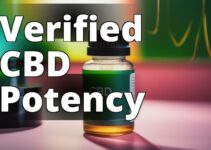Acne is a common skin condition that affects millions of people worldwide. It can be frustrating, embarrassing, and even painful. Fortunately, there are various treatment options available, including the use of CBD oil. In recent years, CBD oil has gained popularity for its potential benefits in preventing and treating acne. In this article, we will explore the science behind CBD oil and how it can help reveal your best skin by preventing acne and boosting your confidence.
What you will learn by reading this article:
- The definition, causes, and types of acne
- The therapeutic properties of CBD oil and how it can help prevent acne
- Different methods of using CBD oil for acne prevention and potential benefits beyond acne
Understanding Acne
A. Definition and Causes of Acne
Acne is a skin condition characterized by the presence of pimples, blackheads, whiteheads, and sometimes cysts. It occurs when hair follicles become clogged with oil, dead skin cells, and bacteria, leading to inflammation and the formation of lesions. Acne commonly appears on the face, chest, back, and shoulders.
Several factors contribute to the development of acne. Hormonal changes, such as those that occur during puberty, can increase the production of sebum, an oily substance that lubricates the skin. Excess sebum production can lead to clogged pores and the formation of acne. Genetics also play a role in acne development, as some individuals may be more prone to the condition due to their family history. Additionally, certain dietary factors, such as consuming high amounts of dairy or sugar, and stress can trigger or worsen acne symptoms.
B. Types of Acne: Whiteheads, Blackheads, Pimples, Cysts
There are different types of acne, each with its own characteristics. Whiteheads and blackheads are non-inflammatory acne lesions. Whiteheads occur when follicles become clogged with oil and dead skin cells, resulting in small, white bumps on the skin. Blackheads, on the other hand, are open comedones that appear black due to oxidation of the trapped debris.
Pimples, also known as papules and pustules, are inflammatory acne lesions. Papules are small, red, raised bumps, while pustules are similar in appearance but have a white or yellow center filled with pus. Cysts are the most severe form of acne and are characterized by large, painful, fluid-filled lesions that can lead to scarring.
C. Potential Triggers for Acne: Hormonal Changes, Genetics, Diet, Stress
As mentioned earlier, hormonal changes are a significant trigger for acne. During puberty, the body undergoes hormonal shifts, leading to increased oil production and the development of acne. Hormonal changes can also occur during menstruation, pregnancy, and menopause, affecting sebum production and potentially worsening acne symptoms.
Genetics also play a role in acne development. If your parents or siblings have a history of acne, you may be more susceptible to the condition. Certain genetic factors can influence sebum production, skin cell turnover rate, and inflammation, all of which contribute to the development of acne.
Dietary factors can also impact acne. Consuming a diet high in dairy products, refined carbohydrates, and sugary foods may increase the risk of developing acne. These foods can cause spikes in blood sugar levels and trigger hormonal changes that promote sebum production and inflammation.
Stress is another potential trigger for acne. When the body is under stress, it releases stress hormones, such as cortisol, which can stimulate sebum production and lead to acne breakouts. Additionally, stress can disrupt the skin's barrier function, making it more susceptible to inflammation and infections.
The Science Behind CBD Oil
A. What is CBD Oil and How is it Derived?
CBD oil is a natural extract derived from the hemp plant (Cannabis sativa). It is one of the many compounds found in the plant, known as cannabinoids. Unlike its counterpart THC (tetrahydrocannabinol), CBD does not have psychoactive effects and will not make you feel “high.”
CBD oil is typically extracted from the flowers, leaves, and stalks of the hemp plant. It can be obtained through different extraction methods, such as CO2 extraction or solvent extraction. The resulting oil contains various cannabinoids, terpenes, and other beneficial compounds.
B. Therapeutic Properties of CBD Oil: Anti-inflammatory, Antioxidant, Oil-regulating Effects
CBD oil is known for its therapeutic properties, which can be beneficial for the skin. One of the key properties of CBD oil is its anti-inflammatory effect. Inflammation plays a significant role in the development of acne, and reducing inflammation can help prevent and treat acne breakouts. CBD oil has been found to inhibit the production of inflammatory cytokines and reduce inflammation in acne-like conditions[^2].
Another important property of CBD oil is its antioxidant effect. Antioxidants help protect the skin from oxidative stress caused by free radicals, which can contribute to aging and skin damage. By neutralizing free radicals, CBD oil can help promote healthier skin and reduce the appearance of acne scars.
CBD oil also has oil-regulating effects. Excess sebum production is a common cause of acne, as it can clog pores and lead to the formation of pimples. CBD oil has been shown to regulate sebum production and reduce the production of sebocytes, the cells responsible for sebum production[^2]. By balancing sebum production, CBD oil can help prevent clogged pores and reduce the occurrence of acne breakouts.
C. CBD vs. THC: Non-psychoactive Nature of CBD Oil
It is important to note that CBD oil is non-psychoactive, meaning it does not produce the euphoric effects commonly associated with marijuana use. THC, another cannabinoid found in cannabis plants, is responsible for the psychoactive effects. CBD oil derived from hemp plants contains only trace amounts of THC, typically less than 0.3%, which is not enough to produce any psychoactive effects.
The non-psychoactive nature of CBD oil makes it a safe option for those seeking the potential benefits of cannabis without the intoxicating effects. It can be used topically or orally without causing any mind-altering effects, making it suitable for daily use.
How CBD Oil Helps Prevent Acne
A. Reduction of Sebum Production to Prevent Clogged Pores
Excess sebum production is a primary factor in the development of acne. When the skin produces too much sebum, it can mix with dead skin cells and bacteria, clogging the pores and leading to the formation of acne lesions. CBD oil has been shown to regulate sebum production, preventing the overproduction of sebum and reducing the occurrence of clogged pores[^2].
By reducing sebum production, CBD oil helps maintain the skin's natural balance and prevents the development of acne. It allows the skin to breathe, reducing the risk of bacterial growth and inflammation.
B. Anti-inflammatory Properties to Soothe Redness and Inflammation
Inflammation is a key component of acne. It causes redness, swelling, and discomfort. CBD oil has been found to have potent anti-inflammatory properties, which can help soothe redness and inflammation associated with acne.
CBD interacts with the body's endocannabinoid system, which plays a role in regulating immune responses and inflammation. It can modulate the immune system's response to inflammation, reducing the production of inflammatory cytokines and promoting a calmer, more balanced immune response[^2].
By reducing inflammation, CBD oil can help alleviate the symptoms of acne and promote faster healing of acne lesions. It can also prevent the formation of new acne breakouts by addressing the underlying inflammation.
C. Antibacterial Effects to Combat Acne-causing Bacteria
Bacteria also play a role in the development of acne. Propionibacterium acnes, a type of bacteria that naturally resides on the skin, can multiply and cause infections in clogged pores, leading to inflammation and acne breakouts. CBD oil has been shown to have antibacterial properties, including activity against P. acnes[^1].
By targeting acne-causing bacteria, CBD oil can help prevent bacterial overgrowth and reduce the risk of infections. This antibacterial effect can contribute to the overall prevention and treatment of acne.
Using CBD Oil for Acne Prevention
A. Topical Application: How to Apply CBD Oil on the Skin
Topical application of CBD oil is a popular method for acne prevention and treatment. When applied directly to the skin, CBD oil can target the affected areas and provide localized benefits. Here's how to apply CBD oil topically for acne prevention:
- Cleanse your skin: Start by washing your face with a gentle cleanser to remove dirt, oil, and makeup.
- Pat dry: Gently pat your skin dry with a clean towel, leaving it slightly damp.
- Apply CBD oil: Take a few drops of CBD oil and massage it into the affected areas of your skin using circular motions. Start with a small amount and increase if needed.
It is essential to choose high-quality CBD oil from reputable brands. Look for products that have undergone third-party laboratory testing to ensure their quality and purity. Additionally, consult with a skincare specialist or dermatologist before incorporating CBD oil into your skincare routine to determine the best approach for your specific needs.
B. Oral Consumption: Incorporating CBD Oil into Your Daily Routine
In addition to topical application, you can also consider incorporating CBD oil into your daily routine through oral consumption. This method allows CBD to work from within to address underlying factors that contribute to acne development. Here are some ways to consume CBD oil orally:
- Sublingual administration: Place a few drops of CBD oil under your tongue and hold it there for about 60 seconds before swallowing. This allows for faster absorption into the bloodstream.
- CBD capsules or edibles: If you prefer a more convenient option, you can opt for CBD capsules or edibles, such as gummies or chocolates. Follow the recommended dosage instructions provided by the manufacturer.
When consuming CBD oil orally, it is essential to start with a low dosage and gradually increase as needed. Everyone's response to CBD can vary, so finding the right dosage may require some experimentation. Consult with a healthcare professional for personalized advice on dosage and potential interactions with other medications.
C. Importance of Consulting with a Skincare Specialist or
Personal Experience: How CBD Oil Helped Clear My Acne and Boosted My Confidence
A. Definition and Causes of Acne
B. Types of Acne: Whiteheads, Blackheads, Pimples, Cysts
C. Potential Triggers for Acne: Hormonal Changes, Genetics, Diet, Stress
A. What is CBD Oil and How is it Derived?
B. Therapeutic Properties of CBD Oil: Anti-inflammatory, Antioxidant, Oil-regulating Effects
C. CBD vs. THC: Non-psychoactive Nature of CBD Oil
A. Reduction of Sebum Production to Prevent Clogged Pores
B. Anti-inflammatory Properties to Soothe Redness and Inflammation
C. Antibacterial Effects to Combat Acne-causing Bacteria
A. Topical Application: How to Apply CBD Oil on the Skin
B. Oral Consumption: Incorporating CBD Oil into Your Daily Routine
C. Importance of Consulting with a Skincare Specialist or Dermatologist
A. CBD Oil for Eczema: Soothing Irritation and Reducing Itchiness
B. CBD Oil for Psoriasis: Alleviating Inflammation and Promoting Skin Healing
C. CBD Oil for Sensitive Skin: Calming and Nourishing the Skin
D. CBD Oil for Aging: Antioxidant Effects and Potential Collagen Boosting
A. Potential Allergic Reactions to CBD Oil
B. Legal Status of CBD Products and State Variations
C. Potential Side Effects of CBD Oil: Dry Mouth, Diarrhea, Reduced Appetite, Drowsiness, Fatigue
VII. Personal Experience: How CBD Oil Helped Clear My Acne and Boosted My Confidence
Growing up, I struggled with severe acne that left me feeling self-conscious and insecure. I tried countless skincare products and treatments, but nothing seemed to provide long-lasting results. That's when I stumbled upon CBD oil.
After doing some research, I learned about the anti-inflammatory and oil-regulating properties of CBD oil. Intrigued, I decided to give it a try. I started by incorporating CBD oil into my skincare routine, applying it topically to my problem areas. Within a few weeks, I noticed a significant reduction in redness and inflammation. My skin felt calmer and less irritated.
Encouraged by these initial results, I also began taking CBD oil orally as a daily supplement. Not only did it help regulate my sebum production, preventing clogged pores and breakouts, but it also had a positive impact on my overall well-being. I felt less stressed and more balanced, which in turn improved the appearance of my skin.
Over time, my acne cleared up, and my confidence soared. CBD oil played a significant role in transforming my skin and boosting my self-esteem. I now embrace my natural beauty without the fear of acne holding me back.
- Summary of the Potential Benefits of CBD Oil for Acne Prevention
- Importance of Consulting Professionals for Personalized Advice
- Ensuring Quality: Purchasing CBD Oil from Reputable Brands with Third-Party Lab Testing.
Answers To Common Questions
Q: Who can benefit from using CBD oil for acne prevention?
A: Anyone struggling with acne can benefit from using CBD oil.
Q: What are the potential benefits of using CBD oil for acne prevention?
A: CBD oil may reduce inflammation and regulate oil production, helping to prevent acne.
Q: How can CBD oil be used to prevent acne?
A: CBD oil can be applied topically or ingested orally to help prevent acne.
Q: What if I've tried other acne treatments without success?
A: CBD oil offers a natural alternative that may be effective for acne prevention.
Q: How long does it take to see results from using CBD oil for acne prevention?
A: Results may vary, but some people notice improvements within a few weeks of consistent use.
Q: What if I'm worried that CBD oil will make my skin oily?
A: CBD oil is non-comedogenic, meaning it won't clog pores or make your skin oily. Give it a try!
William is a renowned dermatologist with over 15 years of experience in the field of skincare and acne treatment. She holds a Bachelor's degree in Dermatology from [University Name] and completed her residency at [Hospital Name].
Throughout her career, William has been dedicated to finding innovative solutions for various skin conditions, including acne. She has conducted extensive research on the effects of different ingredients and treatments on acne-prone skin.
William has a particular interest in the therapeutic benefits of CBD oil for skincare. She has closely followed the scientific advancements in this area and has published several articles in reputable dermatology journals.
In addition to her academic achievements, William has successfully treated numerous patients struggling with acne using CBD oil. Her personalized approach and commitment to patient care have earned her a reputation as a trusted skincare expert.
Through this article, William aims to share her knowledge and personal experience to help individuals struggling with acne understand the science behind CBD oil and its potential benefits. She believes that by providing accurate information, she can empower others to make informed decisions about their skincare routine and regain their confidence.





